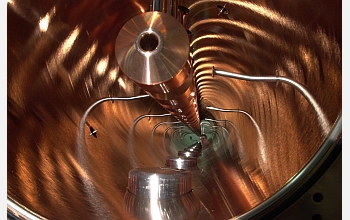|

Press Release 06-101
NSF Launches Distributed Data Analysis of Neutron Scattering

July 5, 2006
The National Science Foundation (NSF) has awarded nearly $12 million to the California Institute of Technology for computer software to analyze neutron-scattering experiments. The work could show how to design new materials for a huge variety of applications in transportation, construction, electronics and space exploration.
The five-year Distributed Data Analysis for Neutron Scattering Experiments (DANSE) project is led by Brent Fultz, a professor of materials science and applied physics at Caltech, with co-principal investigators Michael A. G. Aivazis of the Center for Advanced Computing Research at Caltech, and Ian S. Anderson of the Spallation Neutron Source (SNS) in Oak Ridge, Tenn.
Neutron scattering is a method of analyzing the stability of materials, molecules, and condensed matter at various temperatures and pressures by looking at the positions and motions of the atoms that make up the materials. According to Fultz, the research will find the principles behind how atoms can be combined to form stable materials and will eventually show how new materials could be optimized for characteristics such as mechanical strength, electrical conductivity, energy storage and corrosion resistance.
The low intensities of today's neutron sources have impaired many neutron-scattering measurements. That will change in 2008 as the SNS, constructed by the Department of Energy at a cost of $1.4 billion, begins to operate at high power. The unprecedented quality of data from the SNS will allow a deeper understanding of atomic interactions, for example, and will require better methods for interpreting the measurements.
NSF's DANSE project arises from recent developments in computing, materials theory and the new experimental facilities at the SNS. The project integrates new materials theory with high-performance computing to push the science of the SNS and other neutron facilities to a higher level of sophistication. The project will also extend a software framework developed at Caltech to include distributed computing on today's networked computing hardware.
The DANSE project is centered at Caltech where its software technology effort, neutron-scattering research, and project administration will be conducted. The grant includes smaller awards to four other universities for subfields of neutron-scattering research: neutron diffraction (Simon Billinge, Michigan State University); engineering diffraction (Erstan Ustundag, Iowa State University); small-angle scattering (Paul Butler, University of Tennessee); and reflectometry (Paul Kienzle, University of Maryland). All these different subfields need advanced scientific computing for comparing experimental data to underlying physical models or simulations, and all will benefit from a shared development effort. DANSE will develop new methods for doing neutron-scattering research in these subfields.
The NSF funding will also support an outreach effort in teacher education, which is being created by Iowa State University.
The DANSE award is the first construction award made by the Division of Materials Research under the Instrumentation for Materials Research-Mid-Scale Instrumentation Project since its inception in 2004.
-NSF-

Media Contacts
Robert Tindol, Caltech (626) 395-3631 tindol@caltech.edu
Related Websites
Spallation Neutron Source Web site: http://www.sns.gov/

The National Science Foundation (NSF) is an independent federal agency that supports fundamental research and education across all fields of science and engineering. In fiscal year (FY) 2009, its budget is $9.5 billion, which includes $3.0 billion provided through the American Recovery and Reinvestment Act. NSF funds reach all 50 states through grants to over 1,900 universities and institutions. Each year, NSF receives about 44,400 competitive requests for funding, and makes over 11,500 new funding awards. NSF also awards over $400 million in professional and service contracts yearly.
 Get News Updates by Email Get News Updates by Email
Useful NSF Web Sites:
NSF Home Page: http://www.nsf.gov
NSF News: http://www.nsf.gov/news/
For the News Media: http://www.nsf.gov/news/newsroom.jsp
Science and Engineering Statistics: http://www.nsf.gov/statistics/
Awards Searches: http://www.nsf.gov/awardsearch/
| 

